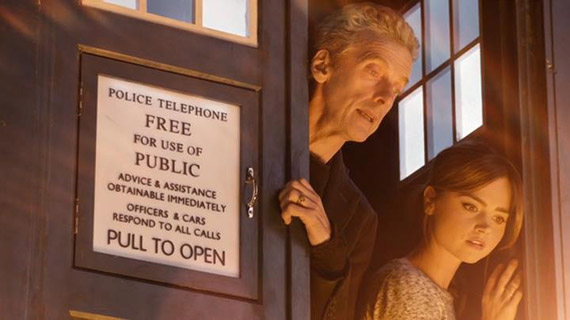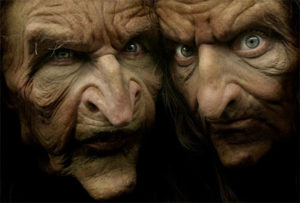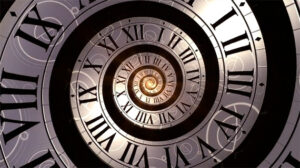Why Doctor Who is a Fantasy Show
David Selby firmly believes that Doctor Who is a fantasy show, more than science fiction.

Most of you reading this will have come across Christoph Schwartz’s fascinating article: The Magic Screwdriver: Does Doctor Who Break Sci-Fi Rules? If you have not, I would highly recommend reading it now, not just because it makes for an entertaining and thought-provoking few minutes, but because it forms the basis of this article, essentially a response of sorts to the points raised. It was only after reading Mr Schwartz’s analysis that I began to contemplate writing this, and the reason it appealed to me so much was that I’ve always had a strong stance on the matter. I firmly believe that Doctor Who is a fantasy show.
Let us first set out a preliminary understanding. Yes, this is an attempt to make sense of Doctor Who, and my effort to persuade you towards an attitude I will defend until the end of time. But it is also a subjective matter, more so than any reading I have done of any episode before. There are positions I can take on matters of Doctor Who with sufficient evidence to say that I’ve more or less hit the point. The nature of Doctor Who as a genre is far more complicated and subjective than that, and, due this complexity, is influenced by our experiences, our preferences, our biases and our worldviews. This is not my declaration of what the show is. This is simply how I understand the show, one flawed but equally valid attempt to conceptualise Doctor Who. There are plenty out there. This one may not be for you, or – as would delight me – you may love it.
And, of course, we’re choosing a definite stance. I could have just as easily hit the middle-ground with this article and gone for ‘Doctor Who is science-fantasy’. Which, in a sense, it is, and my conclusion will support that. Doctor Who is absolutely a synthesis of science and fantasy; it is the broadest and most open-minded speculative fiction out there. But the question I want to ask – and, if we’re being honest, a more interesting question making for more interesting discussion – is whether the show favours fantasy over sci-fi. This is not a debate I want to take a middle-ground on, and not one I would encourage my readers to, at least during the discussion that follows this article. This is, I suppose, an experimental debate, pushing those in the middle – which is most of us – to choose one side. Science, or fantasy?
There are many ways to explain what science is, and indeed what science-fiction is, but I’d like to pick one which pivots around the realm of knowledge. Sci-fi and fantasy – and all genres, to an extent – aim for some sort of knowledge. Because, as is oft-cited, knowledge is power. Fantasy gives us an absurd knowledge which we cannot deny because of the empirical evidence: “Look! There’s a magical world down this rabbit hole, which must exist because you’ve seen it with your own eyes!” Science is, ostensibly, learning through logic: “it doesn’t matter what you can see; one plus two equals three” (and yes, that rhymed).
 Yet from another angle, fantasy is a kind of science. If we accept that there is logic behind the absurd reality we are suddenly confronted with, we must accept that reality should become a part of our science, or invalidate our science altogether. And it makes sense that the fantasy world is one we cannot understand yet. Perhaps the greatest trope of fantasy is that of falling out of the world. The lit-crits have plenty to say about that, but what many often fail to remember is what that means taken literally. Falling out of the world. A jump is something we are prepared for. A fall is something that startles us, and we struggle to recover from it, because we were not expecting to be pulled off our plain in the first place. In other words, we do not understand this strange world we are seeing because we were not meant to be seeing it in the first place. We were meant to understand it first.
Yet from another angle, fantasy is a kind of science. If we accept that there is logic behind the absurd reality we are suddenly confronted with, we must accept that reality should become a part of our science, or invalidate our science altogether. And it makes sense that the fantasy world is one we cannot understand yet. Perhaps the greatest trope of fantasy is that of falling out of the world. The lit-crits have plenty to say about that, but what many often fail to remember is what that means taken literally. Falling out of the world. A jump is something we are prepared for. A fall is something that startles us, and we struggle to recover from it, because we were not expecting to be pulled off our plain in the first place. In other words, we do not understand this strange world we are seeing because we were not meant to be seeing it in the first place. We were meant to understand it first.
Except we couldn’t understand it first, because then it would be science-fiction. Then, it would not be absurd at all. If we look at this, science is not the definite measurement of all things in the universe, but simply what we have proven. If science is our knowledge up until this point, and fantasy is a point beyond that knowledge, then surely fantasy is the truth. Even if fantasy caters to a magic which directly contradicts our science, if that magic exists, then it must be so. That magic has its own set of rules.
 It’s not that Doctor Who complete invalidates science in this way, though. There are times when mythical beings are shown to have scientific causes. There are also times when a magical forest appears overnight. Fantasy is an extended science. It may contradict it in theory, but not in Doctor Who. In Doctor Who, it is a force we are yet to understand. If a menace from a fantasy realm – like the Beast – is faced against the Doctor, the stakes are higher, because we cannot truly understand them. If science is only what we know now, then they are by nature beyond science. They are things of fantasy. They are not an alternative, but an unknowable beyond.
It’s not that Doctor Who complete invalidates science in this way, though. There are times when mythical beings are shown to have scientific causes. There are also times when a magical forest appears overnight. Fantasy is an extended science. It may contradict it in theory, but not in Doctor Who. In Doctor Who, it is a force we are yet to understand. If a menace from a fantasy realm – like the Beast – is faced against the Doctor, the stakes are higher, because we cannot truly understand them. If science is only what we know now, then they are by nature beyond science. They are things of fantasy. They are not an alternative, but an unknowable beyond.
To give credit where credit is due, if we stick to our earlier model of science being what we can prove without empirical evidence, Doctor Who is still scientific to an extent. Even if this logic is not mathematical, things happen as we would expect them to happen. It is not always a spectacle of the absurd. Characters act in a reasonable way, and if they do not, we criticise the script. There are consequences, roughly speaking. There are beginnings, middles and ends (even if they do not occur in that order). Logic is not rigid, but at the least rational.
 Or perhaps more interestingly, logic is fictional. Doctor Who works to the same logic as any good piece of storytelling. As a literary entity, it is a flawless example of how to tell a story. This is how the Doctor Who universe functions – itself a massive story, or a collection of stories, constantly being told, re-told, un-told. And so, sometimes, characters from that universe have not the power over the universe, but the power over a story. Strictly speaking, in The Big Bang, Amy doesn’t restore the universe – she tells a story, virtually writing the Doctor back into her life. The Day of the Doctor, the biggest event in fifty years, shows the Doctor ripping out the last page of his story and re-writing it to make it truer to his own character. The Doctor may just be the narrative genius of this fictional world. Doctor Who is utterly unique – it is not just a story. It is a story told from within the story itself. (Mr Schwartz’s article also tells us of genre-storytelling, which sees the Doctor drop into another kind of story, sometimes literally – see The Mind Robber.)
Or perhaps more interestingly, logic is fictional. Doctor Who works to the same logic as any good piece of storytelling. As a literary entity, it is a flawless example of how to tell a story. This is how the Doctor Who universe functions – itself a massive story, or a collection of stories, constantly being told, re-told, un-told. And so, sometimes, characters from that universe have not the power over the universe, but the power over a story. Strictly speaking, in The Big Bang, Amy doesn’t restore the universe – she tells a story, virtually writing the Doctor back into her life. The Day of the Doctor, the biggest event in fifty years, shows the Doctor ripping out the last page of his story and re-writing it to make it truer to his own character. The Doctor may just be the narrative genius of this fictional world. Doctor Who is utterly unique – it is not just a story. It is a story told from within the story itself. (Mr Schwartz’s article also tells us of genre-storytelling, which sees the Doctor drop into another kind of story, sometimes literally – see The Mind Robber.)
 Still with us? Because that more or less captures the show as a piece of fantasy. It is not fantasy in the sense that it tells us about dragons, castles, witches or wizards, but is fantasy in the sense that it is about a fictional world that almost, but not quite, understands its freedom to tell stories. Doctor Who exists as far as the imagination. If we imagine something to be true, then within Doctor Who, it is. We imagine our own extended science, until the show itself is capable of that same imagination, telling its own stories, setting new records in storytelling. (Mr Schwartz’s analysis of the sonic screwdriver was one of the most telling points, because in so many cases, it goes from being described as a magic wand to being dismissed as a plot device. But quite honestly, in this understanding of fantasy that after a few paragraphs of mad speculation I seem to have settled on – that it exists in the universe of our stories – dismissing it as a plot device more or less proves my point. They didn’t give the Doctor a gun, they gave him a plot device, because that will take him through a story. [And now we’ve hit that tangent, the name Doctor isn’t of scientific connotations but, as A Good Man Goes to War shows, of poetic ones – Doctor is debated as a word. What does it mean to be the Doctor?])
Still with us? Because that more or less captures the show as a piece of fantasy. It is not fantasy in the sense that it tells us about dragons, castles, witches or wizards, but is fantasy in the sense that it is about a fictional world that almost, but not quite, understands its freedom to tell stories. Doctor Who exists as far as the imagination. If we imagine something to be true, then within Doctor Who, it is. We imagine our own extended science, until the show itself is capable of that same imagination, telling its own stories, setting new records in storytelling. (Mr Schwartz’s analysis of the sonic screwdriver was one of the most telling points, because in so many cases, it goes from being described as a magic wand to being dismissed as a plot device. But quite honestly, in this understanding of fantasy that after a few paragraphs of mad speculation I seem to have settled on – that it exists in the universe of our stories – dismissing it as a plot device more or less proves my point. They didn’t give the Doctor a gun, they gave him a plot device, because that will take him through a story. [And now we’ve hit that tangent, the name Doctor isn’t of scientific connotations but, as A Good Man Goes to War shows, of poetic ones – Doctor is debated as a word. What does it mean to be the Doctor?])
 We’d better finish before someone’s brain explodes, but there’s one more thing we could touch on that seems like an important place to leave this: time. Time is, almost undoubtedly, the essence of Doctor Who. Time is at the heart of the show’s most important concepts: the ever-changing Doctor, the unchanging Daleks, the grotesquely-evolving Cybermen, and the very time machine itself. And so maybe, just maybe, time provides the answer we need to round this off. Everything I’ve explored so far can be taken back to time. What we know now and what we are yet to know are two positions determined by points in time. The concept of the fictional story is characterised by time – beginning, middle and end.
We’d better finish before someone’s brain explodes, but there’s one more thing we could touch on that seems like an important place to leave this: time. Time is, almost undoubtedly, the essence of Doctor Who. Time is at the heart of the show’s most important concepts: the ever-changing Doctor, the unchanging Daleks, the grotesquely-evolving Cybermen, and the very time machine itself. And so maybe, just maybe, time provides the answer we need to round this off. Everything I’ve explored so far can be taken back to time. What we know now and what we are yet to know are two positions determined by points in time. The concept of the fictional story is characterised by time – beginning, middle and end.
 So let’s look at the time vortex itself: a raging, powerful, dangerous force that just so happens to hold everything in place. The thing through which the TARDIS, the symbol of salvation and hope, spins to new locations. The thing which the Doctor looked into and was inspired to start his journey in the first place. Let’s acknowledge that. Let’s finally accept that everything in Doctor Who hinges on the time vortex, and that the time vortex is the single most mythical, magical concept in the whole of Doctor Who. If so then yes, science can exist. So can reason, mathematics and even the utterly mundane. That is what the Doctor Who world is – a mad, unpredictable place of wonder and magic where the rational and the intelligent desperately rush around trying to use their scientific logic to make sense of the fantasy. If the time vortex dictates this universe, then so does magic. Doctor Who is a world where science exists not next to, but within the world of fantasy.
So let’s look at the time vortex itself: a raging, powerful, dangerous force that just so happens to hold everything in place. The thing through which the TARDIS, the symbol of salvation and hope, spins to new locations. The thing which the Doctor looked into and was inspired to start his journey in the first place. Let’s acknowledge that. Let’s finally accept that everything in Doctor Who hinges on the time vortex, and that the time vortex is the single most mythical, magical concept in the whole of Doctor Who. If so then yes, science can exist. So can reason, mathematics and even the utterly mundane. That is what the Doctor Who world is – a mad, unpredictable place of wonder and magic where the rational and the intelligent desperately rush around trying to use their scientific logic to make sense of the fantasy. If the time vortex dictates this universe, then so does magic. Doctor Who is a world where science exists not next to, but within the world of fantasy.








